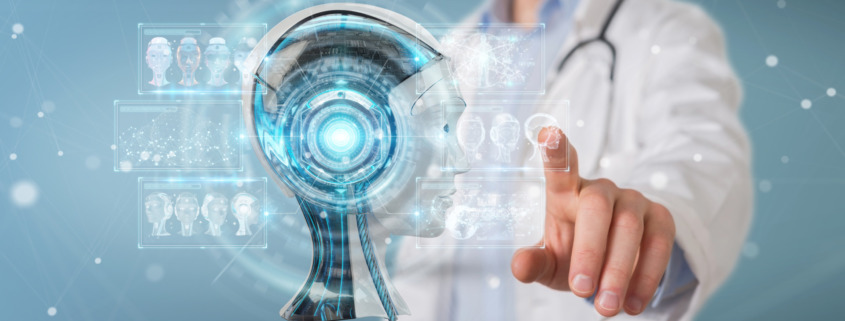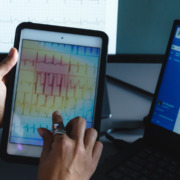Artificial Intelligence in healthcare: solutions, possibilities, trends
Last Updated on 10 de September de 2024 by Redação

The ability to analyze an endless mass of data and learn from it makes Artificial Intelligence a technology with multiple applications. Innovative solutions based on AI are already part of our daily lives. They help us choose the best routes on traffic apps, customize our internet searches, monitor the stock market, shop online and take care of our health.
Medicine, by the way, is one of the human activities that have most benefited from artificial intelligence. Accuracy in diagnostics is one of many applications resulting from the basic AI equation, which consists of big data + efficient data models + cloud computing = intelligent machines.
For healthcare professionals, AI is already impacting work routines in a variety of ways. It is used, for example, to prioritize service queues, helping professionals to identify clinical findings in exams, to select better treatments, and to produce alerts of cases that require attention, anticipating demands in the use of resources (drugs, beds, etc. ). Artificial Intelligence is also the key in evidence-based medicine, as it analyzes mountains of clinical data that humans cannot process.
Read more: Health 4.0: Understanding the Concept and Its Impacts
Solutions that enable the use of Artificial Intelligence in healthcare
Let’s point out some possibilities of AI in health, especially those with the greatest potential to contribute to the excellence of medical care provided by clinics, hospitals and professionals.
- It can be used at all levels of care (primary, secondary or tertiary) by health centers and hospitals;
- It can be used for prevention (primary, secondary, tertiary and quaternary). Examples: selection of groups of patients for the application of vaccines, early detection of diseases, such as breast cancer, and prevention of the installation of comorbidities in hospitalized patients, in addition to avoiding the application of unnecessary interventions;
- It can be used at an epidemiological survaillance level by municipal, state and federal health departments to create health protocols or investment actions.
Read more: AI to speed up urgent cardiological exam reports
AI benefits for clinics and hospitals
Among the benefits that artificial intelligence brings to clinics and hospitals, we could mention:
- Optimization of resources, such as the use of beds;
- Detection of fraud, such as the improper prescription of drugs;
- Indication of lines of care, such as the recommendation of oncological treatments;
- Patient monitoring: vital signs can be checked remotely through the cell phone camera, for example;
- Detection of pathologies in exams;
- Prevention of complications, for example, avoiding suffering from generalized infection;
- Prioritization of patients and consequent reduction of waiting time in serious cases;
- Optimization of the workflow for health professionals;
- Reduction of human errors. AI can, for example, help radiologists to find nodules not yet visible to the eye or classify them as malignant or benign;
- Cost reduction: by reducing comorbidities, optimizing the use of resources, reducing drug/vaccine losses due to validity.
Main trends of Artificial Intelligence in healthcare
Although the term Artificial Intelligence was coined in the 1970s, the technology actually gained traction in the third millennium, and has since advanced at a rapid pace. For the future, the main trend at the moment is the detection of findings in medical examinations.
The next stage will be the multimodal analysis of exams and clinical data. As for the selection of lines of treatment, the most promising perspectives relate to outcome-based medicine and personalized medicine.
Artificial intelligence helps in the diagnosis of Covid-19
A common point between Artificial Intelligence and the coronavirus pandemic is that both, for very different reasons, have been described as accelerators of futures. And accelerating was precisely the objective of Portal Telemedicine when launching an AI model that speeds up the diagnosis process of patients with suspected Covid-19.
Portal Telemedicine’s Covid-19 AI model, developed by its team of engineers, is one of more the automatic pathology detection algorithms that the company has developed throughout its trajectory in imaging exams, capable of helping to streamline the diagnostic process and the correct treatment of emergencies.
Among the solutions developed by Portal Telemedicina in partnership with Google Cloud are, for example:
- Abnormalities detection system: with AIs made with Google, patients with time-critical problems (such as acute myocardial infarction) are treated faster and survive 40% longer.
- Fairness Review Screen: Allows AIs to work equally for all patient types, regardless of ethnicity, gender, and age.
Conclusion
In summary, the adoption of artificial intelligence brings numerous contributions to the health area, being a great help to expand and streamline the capacity to care for patients and act in the prevention and treatment of diseases.
AI is already driving big changes in the way things work and the way people and businesses relate to technology. In a much faster, more intuitive and intelligent way, processes equipped with AI are capable of interpreting data seeking answers to the most different problems and questions, positively impacting and empowering doctors and health professionals to dedicate themselves to their jobs.





